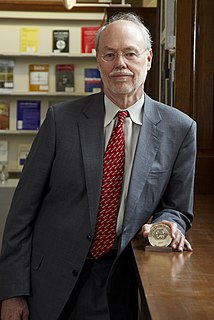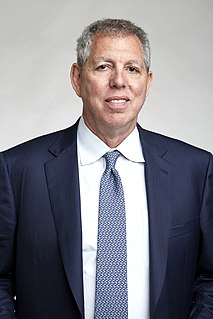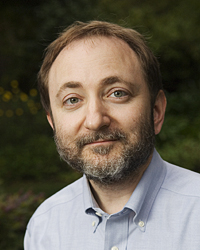
James Dewey Watson is an American molecular biologist, geneticist, and zoologist. In 1953, he co-authored with Francis Crick the academic paper proposing the double helix structure of the DNA molecule. Watson, Crick and Maurice Wilkins were awarded the 1962 Nobel Prize in Physiology or Medicine "for their discoveries concerning the molecular structure of nucleic acids and its significance for information transfer in living material". In subsequent years, it has been recognized that Watson and his colleagues did not properly attribute colleague Rosalind Franklin for her contributions to the discovery of the double helix structure.

Sydney Brenner was a South African biologist. In 2002, he shared the Nobel Prize in Physiology or Medicine with H. Robert Horvitz and Sir John E. Sulston. Brenner made significant contributions to work on the genetic code, and other areas of molecular biology while working in the Medical Research Council (MRC) Laboratory of Molecular Biology in Cambridge, England. He established the roundworm Caenorhabditis elegans as a model organism for the investigation of developmental biology, and founded the Molecular Sciences Institute in Berkeley, California, United States.

Cold Spring Harbor Laboratory (CSHL) is a private, non-profit institution with research programs focusing on cancer, neuroscience, plant biology, genomics, and quantitative biology.

The Nirenberg and Matthaei experiment was a scientific experiment performed in May 1961 by Marshall W. Nirenberg and his post-doctoral fellow, J. Heinrich Matthaei, at the National Institutes of Health (NIH). The experiment deciphered the first of the 64 triplet codons in the genetic code by using nucleic acid homopolymers to translate specific amino acids.

Howard Martin Temin was an American geneticist and virologist. He discovered reverse transcriptase in the 1970s at the University of Wisconsin–Madison, for which he shared the 1975 Nobel Prize in Physiology or Medicine with Renato Dulbecco and David Baltimore.

Phillip Allen Sharp is an American geneticist and molecular biologist who co-discovered RNA splicing. He shared the 1993 Nobel Prize in Physiology or Medicine with Richard J. Roberts for "the discovery that genes in eukaryotes are not contiguous strings but contain introns, and that the splicing of messenger RNA to delete those introns can occur in different ways, yielding different proteins from the same DNA sequence". He has been selected to receive the 2015 Othmer Gold Medal.

Sir Richard John Roberts is a British biochemist and molecular biologist. He was awarded the 1993 Nobel Prize in Physiology or Medicine with Phillip Allen Sharp for the discovery of introns in eukaryotic DNA and the mechanism of gene-splicing. He currently works at New England Biolabs.
Tom Maniatis, is an American professor of molecular and cellular biology. He is a Professor at Columbia University, and serves as the Scientific Director and CEO of the New York Genome Center.

John Frederick William Birney is joint director with Rolf Apweiler of EMBL's European Bioinformatics Institute (EMBL-EBI), in Hinxton, Cambridgeshire and deputy director general of the European Molecular Biology Laboratory (EMBL). He also serves as non-executive director of Genomics England, chair of the Global Alliance for Genomics and Health (GA4GH) and honorary professor of bioinformatics at the University of Cambridge. Birney has made significant contributions to genomics, through his development of innovative bioinformatics and computational biology tools. He previously served as an associate faculty member at the Wellcome Trust Sanger Institute.

Jeffrey M. Friedman is a molecular geneticist at New York City's Rockefeller University and an Investigator of the Howard Hughes Medical Institute. His discovery of the hormone leptin and its role in regulating body weight has had a major role in the area of human obesity. Friedman is a physician scientist studying the genetic mechanisms that regulate body weight. His research on various aspects of obesity received national attention in late 1994, when it was announced that he and his colleagues had isolated the mouse ob gene and its human homologue. They subsequently found that injections of the encoded protein, leptin, decreases body weight of mice by reducing food intake and increasing energy expenditure. Current research is aimed at understanding the genetic basis of obesity in human and the mechanisms by which leptin transmits its weight-reducing signal.

Andrew Zachary Fire is an American biologist and professor of pathology and of genetics at the Stanford University School of Medicine. He was awarded the 2006 Nobel Prize in Physiology or Medicine, along with Craig C. Mello, for the discovery of RNA interference (RNAi). This research was conducted at the Carnegie Institution of Washington and published in 1998.

Joan Elaine Argetsinger Steitz is Sterling Professor of Molecular Biophysics and Biochemistry at Yale University and Investigator at the Howard Hughes Medical Institute. She is known for her discoveries involving RNA, including ground-breaking insights into how ribosomes interact with messenger RNA by complementary base pairing and that introns are spliced by small nuclear ribonucleic proteins (snRNPs), which occur in eukaryotes. In September 2018, Steitz won the Lasker-Koshland Award for Special Achievement in Medical Science. The Lasker award is often referred to as the 'American Nobel' because 87 of the former recipients have gone on to win Nobel prizes.
Sir John Anthony Hardy is a human geneticist and molecular biologist at the Reta Lila Weston Institute of Neurological Studies at University College London with research interests in neurological diseases.

David L. Spector is a cell and molecular biologist best recognized for his research on gene expression and nuclear dynamics. He is currently a professor at Cold Spring Harbor Laboratory (CSHL) and head of the Gene Regulation and Cell Proliferation program of the CSHL Cancer Center. Since 2007, he has served as director of research of CSHL.
Louise Tsi Chow is a professor of biochemistry and molecular genetics at the University of Alabama at Birmingham and a foreign associate with the National Academy of Sciences, known for her research on the human papillomavirus. Her research contributed to the discovery of gene splicing, and in 1993, her collaborator, Richard J. Roberts, received the Nobel Prize for the research, leading some to assert that Chow should have received the honor as well.

Don W. Cleveland is an American cancer biologist and neurobiologist.
Gregory James Hannon is a professor of molecular cancer biology and director of the Cancer Research UK Cambridge Institute at the University of Cambridge. He is a Fellow of Trinity College, Cambridge while also serving as a director of cancer genomics at the New York Genome Center and an adjunct professor at Cold Spring Harbor Laboratory.
Anna Marie (Ann) Skalka is an American virologist, molecular biologist and geneticist who is Professor Emeritus and Senior Advisor to the President at the Fox Chase Cancer Center. She is a co-author of a textbook on virology, Principles of Virology.
John Francis Xavier Diffley is an American biochemist and molecular biologist who is known for his contributions to the understanding of eukaryotic DNA replication. He is Associate Research Director at the Francis Crick Institute in London.

Alberto Kornblihtt is an Argentine molecular biologist who specializes in alternative ribonucleic acids splicing. Kornblihtt is credited with being among the first to document how a single transcribed gene can generate multiple protein variants. Kornblihtt was elected as a Foreign Associate of the National Academy of Sciences of the United States in 2011 and received the Diamond Award for the most relevant scientist of Argentina of the decade, alongside physicist Juan Martin Maldacena, in 2013.














